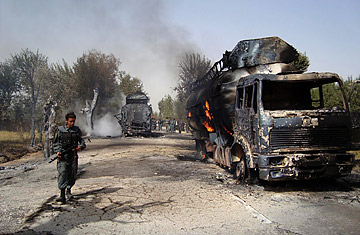
An Afghan police officer walks past a burning truck after a Taliban attack in the Ali Abad area, on the outskirts of Kunduz, on Oct. 2, 2009
To supply nearly 100,000 troops in Afghanistan, the U.S. and its Western allies rely on road convoys with dozens of trucks to carry in everything from jet fuel to frozen pizza. But increasingly these convoys are coming under savage attack by the Taliban. And experts say that if the ambushes get worse, it could impair NATO's efforts to keep a supply lifeline running to its troops in forts and camps scattered across the mountainous country.
Often, the death of a private security contractor in Afghanistan goes unheralded; after all, they risk their lives for money, not country. Yet the drivers and guards who ride shotgun on the long convoys snaking over the mountains also suffer heavy casualties. Many have died heroically. Figures released to TIME by NATO showed that from June to September, more than 145 truck drivers and guards were killed in attacks on convoys and 123 vehicles were destroyed.
In previous years, the Taliban would scale down their attacks because of winter blizzards, but a NATO logistics officer says the militants now have the capacity to launch ambushes on supply routes year round. The Taliban are also widening the scope of their attacks so that convoys rumbling across two-thirds of the country are now prey to attack, usually by roadside bombs or a well-laid ambush in which rocket-propelled grenades are fired at the lead vehicle, forcing the convoy to a deadly standstill.
Last month, Taliban fighters in Kunduz, in northern Afghanistan, hijacked two NATO fuel tankers. The robbery escalated into an international incident because NATO aircraft, following a German request, bombed the two stranded tankers while civilians were siphoning free fuel. The death toll — more than 125 Afghans perished, nearly half of them civilians — overshadowed the gruesome fact that the Taliban had beheaded one of the tanker drivers. Beheadings and killings of NATO supply drivers are a common occurrence, according to several private security contractors.
The main supply arteries into Afghanistan are through mountain passes along the Pakistan border, through the fabled Khyber Pass, near Peshawar, and Spin Boldak in the south. The Khyber Pass was closed down by the Taliban seven times this year, and convoys were unable to get through, according to NATO. Currently, the Pakistani army, under pressure from Washington, is mounting a military operation to sweep Taliban fighters out of the Khyber Pass. On Aug. 30, near Spin Boldak, the Taliban attacked a major NATO convoy and destroyed 25 trucks and military vehicles. Contractors say that Taliban attacks have made vital supplies of fuel and food scarce at some NATO bases.
In trying to explain the worsening security situation on the roads, a British contractor recounts a joke that Afghans love to tell about themselves. It goes something like this: Alexander the Great was marching across the Hindu Kush mountains on his way to India over 2,000 years ago. The Greek had heard that Afghan tribes had fierce fighters, so he dispatched part of his force through the northwest, which was supposed to be the easier route, and led the remainder of his army straight through the middle of the Hindu Kush. The commander who had gone through the northwest, expecting less resistance, arrived exhausted and bloodied on the banks of the Indus River. He had fought every step of the way. But Alexander, who had journeyed through the most dangerous part, hadn't lost a single soldier. "How is that possible?" asked the battered general. "Easy," replied Alexander. "The chief of the Afghan tribes stopped us and said, 'If you want to cross the mountains, either you pay us in gold or we fight.' So I paid," he said with a shrug.
"What was true 2,000 years ago is still true today," says the contractor as he finishes the joke. "If you want to get through the mountain passes, you fight or you pay." Like most contractors interviewed for this article, he preferred to remain anonymous because the U.S. and NATO have understandably strict rules about paying bribes to the Taliban, since that cash can in turn be used to buy more arms for fighting U.S. and NATO forces. NATO observes a "Don't ask, don't tell" policy on such payments. "We know that sometimes the contractors pay bribes to get the trucks through," says a NATO officer, "but they're not required to tell us that."
Taliban spokesman Qari Yusef Ahmadi tells TIME in a telephone interview, "We don't deal with the infidel; we want to destroy them." But he admits that it's possible "low-level Taliban" are taking protection money from NATO's suppliers. Protection money is a major source of revenue for the Taliban, along with their rake-off from drug-trafficking.
The main Kabul-Kandahar highway was once a showpiece for how Western aid would modernize Afghanistan after the fall of the Taliban. Repaved in 2003, the 300-mile highway is now pocked with craters from roadside bombs. Travelers face three or four Taliban checkpoints along the way. A Western businessman says his trucking firm pays a local commander from $5,000 to $6,000 for the safe passage of each fuel tanker along the highway, a sum which he suspects the Taliban get a share of. He also claims that in order to ship fuel from Kandahar to a Dutch base at Tirin Kot, the firm hired a local tribal mafioso who boasted of having a strong militia to protect the convoy. The arrangement worked well until the trucking firm quarreled with the mafioso over a price hike. The next convoy was ambushed, two tankers were set ablaze, and drivers reported that several of the mafioso's gunmen were among the Taliban attackers. After that, the trucking firm forked out the extra fees for protection.
— With reporting by Aryn Baker / Kabul and Muhib Habibi / Kandahar
